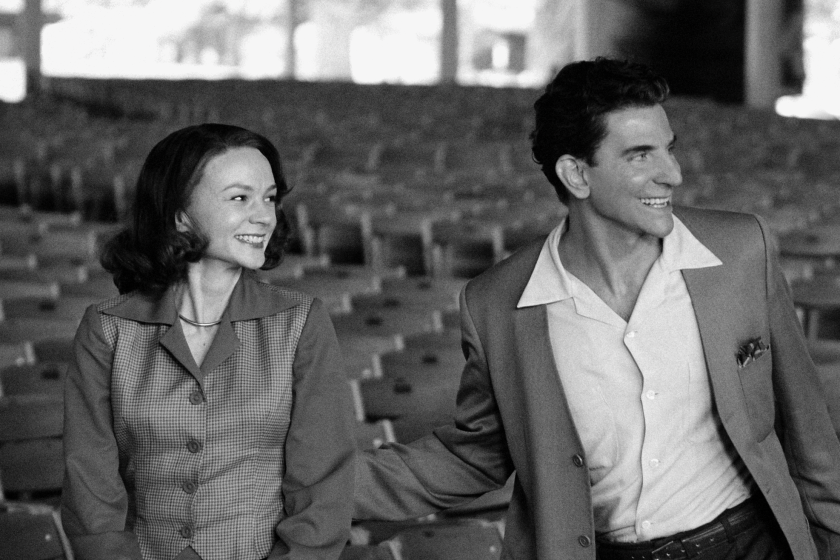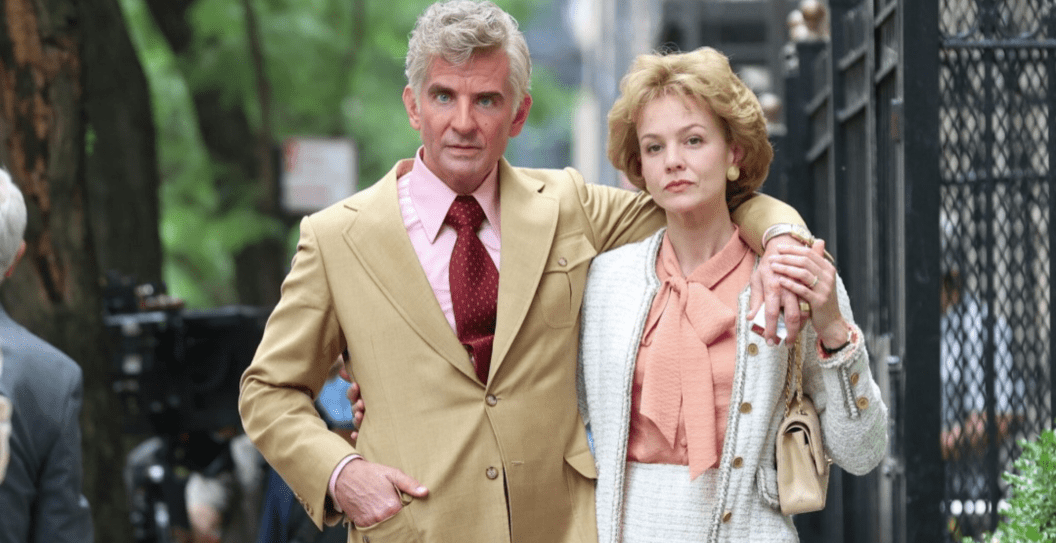The legendary composer and conductor Leonard Bernstein, who led the world's greatest orchestras, won 16 Grammys and created the music for iconic Broadway productions like "West Side Story," lived a turbulent private and professional life full of contradictions. He was a family man but was also frequently pulled away from them to work on his music. He was married to a woman he loved but also had dalliances with men throughout their relationship.
Videos by Wide Open Country
Bradley Cooper tackles the messy, beautiful and contradictory life of Bernstein in "Maestro." He both directs and stars in the film, which is up for seven Academy Awards including Best Picture, Best Actor (Cooper) and Best Actress (Carey Mulligan). However, both have been overlooked this awards season due to performances by Cillian Murphy ("Oppenheimer") and Lily Gladstone ("Killers of the Flower Moon") taking center stage.
Contradiction is the leitmotif of "Maestro." The film opens with a quote from Bernstein: "A work of art does not answer questions, it provokes them; and its essential meaning is in the tension between the contradictory answers."
Opening the film with this quote challenges us to examine the tension and contradictory answers found in Bernstein's life and art.
Indeed, Bernstein's life existed under the tension between contradictory elements: a calm domestic life with his children and a wild cocaine-fueled party, a public image as a married straight man, and a private life as a bisexual one.
But his art also existed under the tension between contradictory elements: the deep, rich drone of a tuba; the sharp, narrow peaks of a violin; the controlled explosion of a drumbeat. These conflicting forces surround Bernstein as he stands in the middle waving his baton like a madman, fighting desperately, passionately to keep everything in sync. What is music, if not the tension between contradictory answers?
In his art, this tension made him a genius. But in his private life, this tension made him a difficult man to love. And the toll it took on his family — particularly his wife, Felicia Montealegre — is given as much attention in "Maestro" as his musical brilliance. Nevertheless, the film argues, Bernstein acted not out of selfishness or greed, but out of pure and unbridled love for the world and all the people and music it holds.
Keep going for our full analysis of "Maestro."
Warning: Spoilers Ahead
Bernstein's Rise to Fame

Netflix
The film opens with an elderly Bernstein playing the piano, reflecting on his rise to fame and his life with Felicia — but mainly the latter. With facial prosthetics to age him up, Cooper resembles the spitting image of Bernstein. Cooper also looks a lot like Bernstein when he plays the younger years of his life, and he could have nailed the look without that fake nose glued to his face.
The film turns into black and white as we enter the flashback, which begins at Leonard's big break: the guest conductor for the New York Philharmonic becomes sick with the flu and Leonard fills in despite having no rehearsal. The feel-good story would launch him to instant fame. And the moment is depicted in a gorgeous, single shot that follows Bernstein as he throws open the curtains of his apartment and dances into Carnegie Hall, where the camera sweeps across the ornate auditorium. He soon meets an aspiring actress named Felicia Montealegre and the two fall in love. Their courtship is told through a dazzling musical number replete with sailors dancing ballet and the song "New York New York" blaring over the spectacle.
Cooper's love for the enthusiastic, charming, chain-smoking Bernstein is palpable as the conductor whisks us from scene to scene. These depictions of the good times have the rollicking, brisk pace of a Broadway show. Which makes the sudden onset of a somber, introspective scene hit like a freight train.
Immediately after the musical love affair, we cut to a quiet moment of Bernstein and Felicia lying on the floor together, wrapped in sheets (Bernstein had a bad back and Felicia suggested cuddling on the floor to alleviate the pain). Here, Bernstein confesses to having had fantasies as a young man about killing his father, who didn't want him to pursue music. And later, over dinner, an older composer tells Bernstein to "clean up" (hinting at his bisexuality). He also suggests Bernstein change his name to "Burns" as his Jewish name won't have as broad of an appeal. Bernstein's defiance of these men again makes me think of his life as an orchestra he's conducting. He could never be put in a box, could never be the one thing that others wanted him to be. He, like an orchestra, was many disparate components blended into a harmony.
Finding His Muse

Netflix
A big part of the film is about how Bernstein, amidst the contradictions in his life, is constantly seeking his muse. He searches for this muse down numerous paths that ultimately lead to dead ends, like drugs and brief carnal relationships with young men. His muse was with him the whole time, however, and he doesn't truly realize this until it's too late.
During a sweet moment in the first half, Felicia encourages a downtrodden Bernstein. "If summer doesn't sing in you, then nothing sings in you," she says, tussling his hair. "And if nothing sings in you, then you can't make music." What they have is truly special, and Bernstein needs her more than he realizes.
As Bernstein's relationship with Felicia progresses, he becomes more distant. His career takes precedence over her and their new family. This is shown through some clever work by cinematographer Matthew Libatique. We see a faraway shot of Felicia standing illuminated in the center of the screen. Bernstein is conducting and his shadow looms large over her. A close-up of her face shows a mix of pride, love and uncertainty, slightly obscured by smoke from the cigarette burning in her fingers. How Mulligan managed to show all of these emotions at once is beyond me — but her Oscar nomination is more than deserved.
Felicia longs to be his muse. A young man is taking most of Bernsetin's attention when he completes his famous "Mass." Felicia, feeling as though this new guy inspired "Mass" instead of her, responds by jumping into the pool and sinking to the bottom. The tension between Bernstein and Felicia comes to a head as the family gathers to watch Macy's Thanksgiving Day Parade from their Manhattan apartment. They tear into each other in a brutal screaming match. Felicia accuses him of making music not out of love, but out of hate — a desire to lord his genius over everyone else. In the silence after her berating, a giant Snoopy balloon floats past their window as the parade passes — a humorous exclamation point to the scene.
But later, when Felicia sees Bernstein conduct "Mass" in a cathedral, she is moved to tears. They embrace, and she tells him that everything he does is with love.
Shortly after their reconciliation, Felicia is diagnosed with cancer. For the first time, Bernstein drops everything to be with her. The quick pace of the film — just like Bernstein's career — comes to a grinding halt. "Maestro" adopts an entirely different tone here, taking a long look at Felicia's decline. We see lingering moments of Felicia breaking down into tears, the family coming together for a hug. It's agonizing to watch. But Mulligan's performance commands us to do so anyway. She releases us only when Felicia finally succumbs to her illness and dies in Bernstein's arms.
Bernstein continues to conduct and teach and bed young men. But at the very end of the film, we see an ethereal image of Felicia in a sunny setting. Her voice echoes her words from earlier: "If summer doesn't sing in you, then nothing sings in you." She then turns her back on the camera — on Bernstein. This indicates that she was his muse all along. And with her passing, that museful inspiration, that summer song, has also passed. Bravo.
Did 'Maestro' Deserve to Get Snubbed?
So did the biopic deserve to get snubbed this season? It's hard to say. Similar to how Berstein's entire life was centered around his art, Cooper notoriously dedicated six years of his life to learning to conduct and was involved in every aspect of this film. — even going so far as to direct the film still in character. Though his nominations for Best Actor and Best Picture were deserved, the true magic of the film comes from Mulligan's quietly grounded performance. It's easy to see how it could have been overshadowed by Gladstone or even Emma Stone in "Poor Things" because it was just so different. Any other year, it's possible Cooper and Mulligan could have easily been frontrunners. Despite the fact that the buzz around this film was a bit lackluster (based on Cooper's reactions at every single awards ceremony), it's still a magnificent film worth seeing.
Stream 'Maestro' on Netflix.




